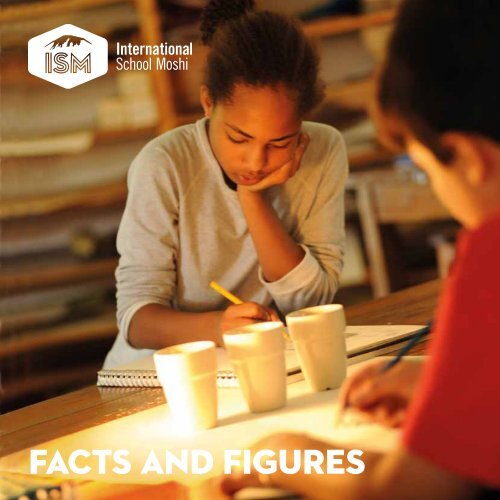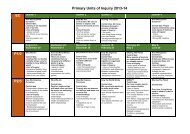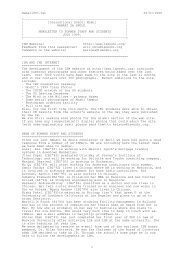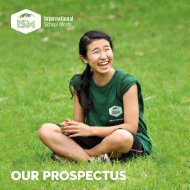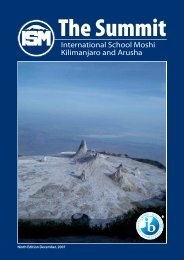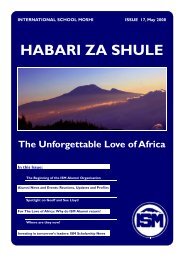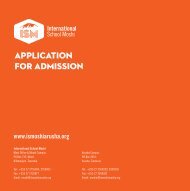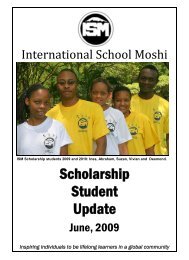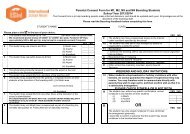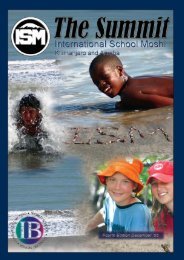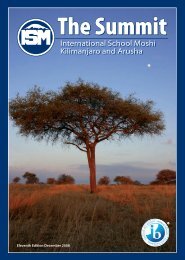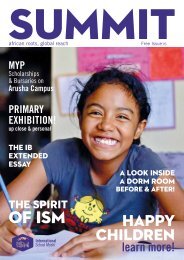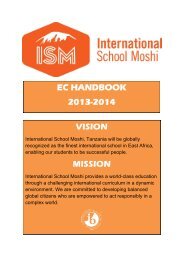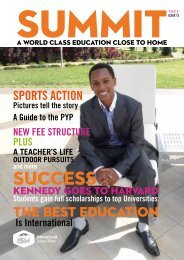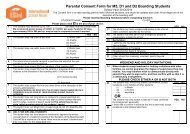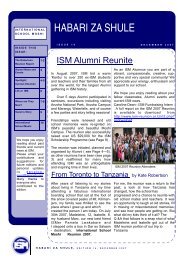ISM Facts & Figures - International School Moshi
ISM Facts & Figures - International School Moshi
ISM Facts & Figures - International School Moshi
You also want an ePaper? Increase the reach of your titles
YUMPU automatically turns print PDFs into web optimized ePapers that Google loves.
<strong>Facts</strong> and <strong>Figures</strong>
Contents<br />
3 Introduction<br />
4 Our <strong>School</strong> and Guiding Statements<br />
6 Our figures , IB comparisons and grade level data<br />
8 The IB Diploma<br />
10 Middle Years<br />
12 Primary Years<br />
14 Boarding<br />
15 Pastoral care<br />
16 Sports and Outdoor Pursuits<br />
18 CAS<br />
www.ismoshiarusha.org<br />
info@ismoshiarusha.org<br />
Keiron White, Head of <strong>Moshi</strong> Campus<br />
Éanna O’Boyle, Head of Arusha Campus<br />
<strong>International</strong> <strong>School</strong> <strong>Moshi</strong><br />
<strong>International</strong> <strong>School</strong> <strong>Moshi</strong><br />
PO Box 733, <strong>Moshi</strong>, Kilimanjaro, Tanzania<br />
PO Box 2691, Arusha, Tanzania<br />
Tel: +255 27 2755004, 2755005, 2751850 Tel: +255 27 2505029, 2505030<br />
Fax: +255 27 2752877 Fax: +255 27 2505031<br />
Email: moshi@ismoshiarusha.org<br />
Email: arusha@ismoshiarusha.org<br />
Further information, photos and documents are available on the internet from www.ismoshiarusha.org<br />
2013
www.ismoshiarusha.org<br />
info@ismoshiarusha.org<br />
WELCOME<br />
There are not too many schools like <strong>International</strong><br />
<strong>School</strong> <strong>Moshi</strong>. We are two campuses. Each campus<br />
lies at the foothills of two of the biggest mountains<br />
on the continent. We are a boarding and day school.<br />
We offer a truly international education in the form<br />
of the <strong>International</strong> Baccalaureate (IB).<br />
Every year, our students earn scholarships to<br />
universities around the world. Our students and<br />
teachers come from all corners of the world and<br />
represent over forty nations. We have a vibrant<br />
Outdoor Pursuit Programme, a world-renowned<br />
Visiting <strong>School</strong>s Programme, and we were the first<br />
IB school on the continent.<br />
We are proud of our historical legacy. <strong>International</strong><br />
<strong>School</strong> <strong>Moshi</strong> (<strong>ISM</strong>) became the first <strong>International</strong><br />
Baccalaureate (IB) school in Africa when it started<br />
offering the IB Diploma in 1973. <strong>ISM</strong> was also<br />
instrumental in the creation and development of<br />
what the world now knows as the IB Middle Years<br />
Programme in the early 1980s, a programme which<br />
builds on the philosophy of the IB Diploma Programme.<br />
We are a three-programme IB school meaning that<br />
we teach the Primary Years Programme (from 3 to<br />
11 years of age), Middle Years Programme (11-16)<br />
and Diploma Programme (16-19).<br />
Rigour, reflection and relevance lie at the heart of<br />
what a world-class education entails. The <strong>International</strong><br />
Baccalaureate programmes educate the whole person<br />
and aim to develop inquiring, knowledgeable and<br />
caring young people. We encourage students to become<br />
active, compassionate and lifelong learners with the<br />
aim of ensuring they are successful in this modern and<br />
changing world.<br />
Our students are ideally placed to move comfortably<br />
to a range of other schools and renowned universities<br />
around the world because they are self-disciplined,<br />
resourceful and creative. Students interact and debate<br />
in a multicultural setting, providing them with skills<br />
that will serve them far beyond university.<br />
We welcome your child to our school and look forward<br />
to seeing her or him join us for a unique world class<br />
education.<br />
Karibuni<br />
Keiron White Head of <strong>Moshi</strong><br />
Éanna O’Boyle Head of Arusha<br />
3
www.ismoshiarusha.org<br />
info@ismoshiarusha.org<br />
Our <strong>School</strong><br />
The campuses<br />
<strong>ISM</strong> is a school on two campuses, one in <strong>Moshi</strong> at the foot of<br />
Kilimanjaro and one in Arusha at the foot of Mount Meru. Both are on<br />
20-hectare sites with beautiful grounds that include sports fields,<br />
swimming pools, outdoor hard courts and covered sports facilities.<br />
<strong>Moshi</strong> Campus offers an IB education to both day students and<br />
boarders aged from three to nineteen. The Arusha Campus caters for<br />
day students aged from three to sixteen in the primary and middle<br />
years.<br />
Governance<br />
The Governing Board of <strong>ISM</strong> is composed of ten voting members. The<br />
Shareholders appoint eight of these members and two are elected<br />
from the parent association. In addition to the voting members, the<br />
director, the two heads of campus, the finance manager, two teacher<br />
representatives, and two students are regular ex-officio members of<br />
the Governing Board.<br />
Guiding Statements<br />
Philosophy<br />
Learning is a lifelong process nurtured through an education that is<br />
inspirational in nature, holistic in perspective, global in context and<br />
responsible in practice.<br />
Beliefs<br />
We believe that the following statements define and promote personal<br />
excellence in all facets of education, the pursuit of which is the<br />
expectation for all.<br />
• Learning takes place in a safe, collaborative and caring environment<br />
• An education that is inspirational in nature emphasises inquiry, relevance,<br />
creativity, and reflection.<br />
• Holistic learning encompasses the development of social, emotional,<br />
cognitive and physical dispositions.<br />
4<br />
• Holistic learning explores the links between different subjects and connects<br />
experiences within and outside the classroom.<br />
• Education in a global context promotes an appreciation and understanding<br />
of multiple perspectives and interdependence of individuals, societies and<br />
environments.<br />
• Being responsible involves having attitudes and undertaking actions that<br />
are socially and ethically sound.<br />
• Being responsible entails prudent use of resources, and mindful application<br />
of knowledge.<br />
Mission<br />
<strong>International</strong> <strong>School</strong> <strong>Moshi</strong> provides a world-class education through a<br />
challenging international curriculum in a dynamic environment. We are<br />
committed to developing balanced global citizens who are empowered<br />
to act responsibly in a complex world.<br />
Vision<br />
<strong>International</strong> <strong>School</strong> <strong>Moshi</strong> will be globally recognized as the finest<br />
international school in East Africa, enabling our students to be<br />
successful people.<br />
Goals<br />
This will be accomplished by:<br />
• Providing the finest student-centred educational programmes through the<br />
<strong>International</strong> Baccalaureate (PYP, MYP, DP).<br />
• Offering internationally recognized qualifications enabling entry to the finest<br />
universities in the world.<br />
• Recruiting and retaining the finest staff who are highly qualified,<br />
experienced, dynamic, and caring.<br />
• Extending and developing networks with local, regional and international<br />
partnerships.<br />
• Supporting educational, cultural and personal development through<br />
engagement with our communities.<br />
• Making full use of the opportunities offered by the unique location and<br />
environment.<br />
• Building an effective and efficient organization able to continually develop<br />
and improve our educational, financial and operational performance.
www.ismoshiarusha.org<br />
info@ismoshiarusha.org<br />
OUR CURRICULUM<br />
“An unwavering gold standard. The independence of the<br />
<strong>International</strong> Baccalaureate ensures its grades are never inflated.”<br />
The Daily Telegraph<br />
The <strong>International</strong> Baccalaureate Programmes<br />
Over the last 45 years the IB has earned a reputation for providing quality<br />
education, high standards, consistent and rigorous assessment, and leadership<br />
in international education. The IB’s three programmes for students aged 3 to<br />
19 help develop the intellectual, personal, emotional and social skills to live,<br />
learn and work in a rapidly globalizing world. At present there are 1.1 million IB<br />
students at 3,665 schools in 146 countries studying the PYP, MYP and Diploma<br />
programmes.<br />
<strong>ISM</strong> Grade Levels versus year levels in various countries<br />
Age <strong>ISM</strong><br />
USA, Canada,<br />
S. Korea,<br />
Vietnam<br />
UK<br />
(England & Wales) Tanzania 1 Australia<br />
New<br />
Zealand Netherlands France<br />
India/<br />
Germany Singapore<br />
3-5 EC Preschool Reception (KS1) Nursery Kindergarten Groep 1 MS Kindergarten Preschool<br />
5-6 P1 Kindergarten Year 1 (KS1) Standard 1 Prep Year 1 Groep 2 GS Kindergarten Preschool<br />
6-7 P2 Grade 1 Year 2 (KS1) Standard 2 Year 1 Year 2 Groep 3 CP Grade 1 Primary 1<br />
7-8 P3 Grade 2 Year 3 (KS2) Standard 3 Year 2 Year 3 Groep 4 CE1 Grade 2 Primary 2<br />
8-9 P4 Grade 3 Year 4 (KS2) Standard 4 Year 3 Year 4 Groep 5 CE2 Grade 3 Primary 3<br />
9-10 P5 Grade 4 Year 5 (KS2) Standard 5 Year 4 Year 5 Groep 6 CM1 Grade 4 Primary 4<br />
10-11 P6 Grade 5 Year 6 (KS2) Standard 6 Year 5 Year 6 Groep 7 CM2 Grade 5 2 Primary 5<br />
11-12 M1 Grade 6 Year 7 (KS3) Standard 7 Year 6 Year 7 Groep 8 Sixième Grade 6 Primary 6<br />
12-13 M2 Grade 7 Year 8 (KS3) Form 1 Year 7 Year 8 Brugklas 3 Cinquième Grade 7 Secondary 1<br />
13-14 M3 Grade 8 Year 9 (KS3) Form 2 Year 8 Year 9 VMBO/HAVO/VWO Quatrième Grade 8 Secondary 2<br />
14-15 M4 Grade 9 Year 10 (KS4) (IGCSE1) Form 3 Year 9 Year 10 VMBO/HAVO/VWO Troisième Grade 9 Secondary 3<br />
15-16 M5 Grade 10 Year 11 (KS4) (IGCSE2) Form 4 Year 10 Year 11 VMBO/HAVO/VWO Seconde Grade 10 Secondary 4 4<br />
16-17 D1 Grade 11 Year 12 (KS5) (A1) Form 5 Year 11 Year 12 HAVO/VWO Première Grade 11 JC1<br />
17-18 D2 Grade 12 Year 13 (KS5) (A2) Form 6 Year 12 Year 13 VWO Terminale Grade 12 JC2<br />
1 Tanzania: Entry to school is officially at age 7. Standard 1 is equivalent in curriculum to <strong>ISM</strong>’s P1, but students are usually a year or more older.<br />
2 Germany: In grade 5, students enter a tracked process. Able students enter gymnasium and attend to grade 12, on a track for university.<br />
There is also a vocational/technical “middle” track from grades 5-10, and a “basic” track from grades 5-9 (which can also add an extra grade).<br />
3 Netherlands: After primary school (groep 1-8), students enter a tracked process. Able students enter VWO to age 18, middle-ability students enter HAVO to age 17,<br />
and basic ability students enter VMBO to age 16.<br />
4 Singapore: Students may leave school after Secondary 4. University-bound students enter JC (Junior College) grades.<br />
5
www.ismoshiarusha.org<br />
info@ismoshiarusha.org<br />
OUR FIGURES<br />
<strong>Figures</strong><br />
In August 2013 the school had:<br />
<strong>Moshi</strong><br />
Arusha<br />
Boarders 150 N/A<br />
Day students 160 200<br />
Boys 160 100<br />
Girls 150 100<br />
Nationalities 32 35<br />
Our Results<br />
• In the last 5 years, 26% of <strong>ISM</strong>’s IB students have scored 35 IB<br />
points or more, equal to 501+ UCAS* points. An A Level student<br />
would need more than four grade A’s at A Level to attain this.<br />
• An average <strong>ISM</strong> student (31 IB points) is given 413 UCAS points for<br />
university entrance in the UK. An A Level student with three grade A’s<br />
only gets 360 UCAS points.<br />
• A Grade 7 (top grade) in IB Diploma higher level is rated by UCAS as<br />
superior to a grade A in A Level. But Diploma students usually take<br />
6 subjects. A level students only take 3 or 4.<br />
• 94% of our students go on to university or further education.<br />
• 89% of our students achieved success at IB Diploma in the last<br />
3 years.<br />
* The UCAS Tariff is the system for allocating points to qualifications used for<br />
entry to universities in the UK<br />
PYP and MYP student performance measured<br />
The Australian Council for Educational Research, a leading educational<br />
research organization, recently released the findings of an IBcommissioned<br />
study examining the performance of IB students and<br />
non-IB students on the <strong>International</strong> <strong>School</strong>s Assessment (ISA).<br />
The results indicate that<br />
• Primary Years Programme (PYP) and Middle Years Programme (MYP)<br />
students performed as well as or better than their non-IB peers<br />
across all four ISA assessment domains (math literacy, reading,<br />
narrative writing, and expository writing) in a majority of grade<br />
levels, with particularly strong differences in grade ten (15-16 years<br />
of age) math and expository writing.<br />
• In addition, IB students’ ISA scores in grades nine (14-15 years of<br />
age) and ten compare favorably to Programme for <strong>International</strong><br />
Student Assessment (PISA) benchmarks in math and reading.<br />
• The study also reviewed MYP moderation results from IB schools<br />
participating in the ISA and found that the MYP moderation results<br />
align strongly with ISA assessment areas and measure common<br />
skills. This finding provides evidence for the validity of the MYP<br />
moderation process.<br />
The ISA is designed specifically for students in international schools<br />
worldwide and assesses student performance in Grades 3 to 10 (2 -16<br />
years of age). The math and reading components of the assessment<br />
are based on the reading and mathematical literacy frameworks of the<br />
OECD’s (Organisation for <strong>International</strong> Co-operation and Development)<br />
PISA. A full summary of the results can be found on the IB website.<br />
For further information about this study, contact the IB Research<br />
Department at ibru@ibo.org<br />
6
www.ismoshiarusha.org<br />
info@ismoshiarusha.org<br />
University and beyond<br />
“The IB standards demonstrate a very high degree of alignment with<br />
the Knowledge and Skills for University Success (KSUS) standards in<br />
all subject areas. In addition, many of the individual IB standards are<br />
at a level more advanced than entry-level college courses.”<br />
David Conley and Terri Ward, Educational Policy Improvement Center, Eugene, Oregon, USA<br />
IB Diploma and Universities<br />
Recognized as the leader in international education, the <strong>International</strong><br />
Baccalaureate (IB) Diploma Programme cultivates the knowledge, skills<br />
and attitudes that enable students to excel in university.<br />
Why do universities value IB students?<br />
The IB Diploma is widely recognized by universities as an ideal<br />
qualification. Below are some facts and figures about <strong>ISM</strong> scores in<br />
the IB Diploma and some comparisons between the IB Diploma and A<br />
Levels.<br />
IB students are prepared for academic success.<br />
• IB students are more likely than others to enroll in and graduate from selective<br />
higher education institutions.*<br />
• Based on their experiences, IB students possess a broader range of skills<br />
that enhance their ability to adapt and contribute to university life.<br />
• IB students demonstrate a level of emotional and intellectual maturity for<br />
managing the demands of challenging coursework and make meaningful<br />
contributions.<br />
• They have extensive experience doing independent research and presenting<br />
what they have learned through presentations, papers and other projects.<br />
• They think critically and draw on diverse perspectives that reflect an international<br />
outlook.<br />
• Participation in the IB Diploma Programme shows that students have<br />
excelled in multiple and diverse academic challenges and is a strong<br />
predictor for success in university.*<br />
*IB analysis of data obtained from the National Student Clearinghouse (NSC) for students who<br />
took examinations in May 2000 and May 2001 and Integrated Postsecondary Education Data<br />
System (IPEDS) of National Center for Education Statistics. Research reports available at www.<br />
ibo.org/research/programmevalidation.<br />
Universities and IB <strong>Figures</strong><br />
• IB Diploma students are more than twice as likely to enter the UK’s top<br />
20 universities than A Level students.<br />
• IB Diploma students are over 30% more likely to obtain a first class degree<br />
in the UK than A Level students.<br />
• IB Diploma students are more likely to obtain an upper second class degree<br />
in the UK than A Level students.<br />
• The median salary of IB Diploma graduates is about $2500 higher than that<br />
of A Level or equivalent graduates.<br />
• 57% of UK universities believed that IB diploma students had an advantage<br />
in admission over A Level students.<br />
• The majority of UK universities rate the IB higher than A Level in areas of<br />
critical thinking, communication, self management, and motivation.<br />
• 96% of UK university respondents appreciated broad curricula and liked<br />
this aspect of the IB Diploma.<br />
IB Diploma vs. A Levels vs Advanced Placement<br />
IB Diploma<br />
A Levels - UK<br />
An IB Dip student who receives An A Level student<br />
a 7 (highest mark in IB) is who achieves a grade<br />
rated highly by UCAS A is rated lower by<br />
comparison<br />
An IB student who scores 31<br />
points in the diploma program<br />
is awarded 413 UCAS points<br />
An IB student who scores 35<br />
points in the diploma program<br />
is awarded 501+ UCAS points<br />
An A level student with<br />
three grades of “A”<br />
is awarded 360 UCAS<br />
points<br />
An A Level Student would<br />
need 4 grade A’s to attain<br />
the same rating<br />
IB Dip students are required A Level Students usually<br />
to take a minimum of 6 subjects take 3 to 4 subjects<br />
Advanced Placement<br />
(AP) - USA/Canada<br />
An AP student who<br />
achieves the highest<br />
grade is rated lower by<br />
comparison<br />
An AP student with three<br />
grades of “5” (highest<br />
grade) is awarded<br />
360 UCAS points<br />
Four grade 5s (highest<br />
grade) would give only<br />
480 UCAS points.<br />
AP students usually take<br />
between 2 to 5 courses.<br />
7
www.ismoshiarusha.org<br />
info@ismoshiarusha.org<br />
“The IB does put you significantly ahead in<br />
the global race for the best universities.”<br />
8<br />
Financial Times UK
www.ismoshiarusha.org<br />
info@ismoshiarusha.org<br />
The <strong>International</strong><br />
Baccalaureate Diploma<br />
Ages 16 – 19<br />
A Diploma student participates in<br />
• Six subjects<br />
• An extended essay<br />
• A Theory of Knowledge course<br />
• ‘Creativity, Action and Service’ (CAS) activities.<br />
The Theory of knowledge<br />
The Theory of Knowledge (ToK) course is composed almost entirely of<br />
questions. The most central of these questions is ‘How do we know’ which<br />
ToK applies to many different, yet interrelated, topics. Students explore how<br />
different subject areas like natural science, social science, mathematics,<br />
history, art and ethics interpret knowledge and how each seek knowledge.<br />
The six subjects<br />
Three subjects are taken at higher level and three at standard level<br />
continuously over the two years of the programme. Subjects must be<br />
chosen from EACH of groups 1 to 5 below, and the sixth subject may be<br />
Visual Arts, or a second choice from Groups 3 or 4.<br />
Group 1<br />
First Language<br />
Group 2<br />
Second Language<br />
English Literature [HL], English Language &<br />
Literature [SL], Swahili Literature (HL or SL]<br />
English Language Acquisition [HL or SL], French Language<br />
Acquisition [HL or SL]<br />
Swahili Language Acquisition [HL or SL], Swahili for beginners<br />
[SL], Spanish for beginners [SL online], Mandarin for<br />
beginners [HL or SL online]<br />
Group 3<br />
Economics [HL or SL] or Geography [HL or SL] or<br />
Individuals & Societies Information Technology in a Global Society (ITGS) [HL or SL],<br />
History [HL or SL], Psychology [HL or SL online]<br />
Group 4<br />
Biology [HL or SL] or Environmental Systems & Societies<br />
Experimental Sciences [SL] or Physics [HL or SL], Chemistry [HL or SL]<br />
Group 5<br />
Mathematics<br />
Group 6<br />
Mathematics [HL or SL] or<br />
Mathematical Studies [SL]<br />
Visual Arts [HL or SL], Music [SL]<br />
Note that due to timetabling limitations, certain combinations of subjects are not possible. Subjects linked<br />
by ‘or’ in the boxes above cannot be taken together, the same language cannot be studied at more than<br />
one level, and History, Chemistry and Visual Arts are taught at the same time. Subjects on offer may vary<br />
slightly depending on demand. If students wish to study another language other than those listed above,<br />
we will try to find a suitable teacher and will offer whatever assistance we can. In such cases, additional<br />
costs may have to be borne by parents and the provision of a teacher cannot always be guaranteed.<br />
The extended Essay<br />
The 4000-word research-based Extended Essay focuses on a particular<br />
aspect of one of the subjects. A supervisor leads each student, over<br />
a number of months, through a process of thorough research and<br />
persuasive writing. The skills developed in writing the extended essay<br />
prove extremely useful for students when they engage in academic<br />
research at university.<br />
Creativity action and service<br />
Throughout the diploma years students are required to participate regularly<br />
in creative, active and service projects. There is a wide variety of projects<br />
from which to choose and further details are available in the CAS section.<br />
To study for a full IB Diploma at <strong>ISM</strong>, a student should have shown<br />
previous competence in a majority of the six subjects to be studied,<br />
respect for their colleagues and the ethos of his/her school as reflected<br />
in past reports, and the maturity to take responsibility for future study.<br />
Alternatives to The full IB diploma<br />
Given the challenging nature of the full IB Diploma, some students may<br />
choose a modified programme of up to five or six subjects, with a majority<br />
at Standard level, from within the timetable structure. They will do the full<br />
coursework and examinations in these subjects and receive a certificate<br />
in place of the full diploma. These students do not usually study Theory of<br />
Knowledge or write an Extended Essay. Many such students excel because<br />
their course load is tailored to their capabilities. Good subject Scores<br />
will enable entry into many US universities and a number of colleges and<br />
universities in other countries.<br />
Beyond the diploma<br />
Advice and support is provided by the school’s university and college<br />
advisor. In addition <strong>ISM</strong> provides support for students taking ACT, SAT,<br />
TOEFL or other tests required for university entrance.<br />
In recent years our students have averaged a 89% success rate in the<br />
IB diploma examinations. After completing the Diploma programme,<br />
the vast majority of our graduates go on to universities or colleges in<br />
Canada, UK, USA and elsewhere.<br />
9
www.ismoshiarusha.org<br />
info@ismoshiarusha.org<br />
The Middle Years<br />
Ages 11 – 16<br />
“The MYP articulates a much needed bridge between what is typically learned in schools<br />
and the most pressing questions that concern our societies. Attentive to adolescents’<br />
development, the programme emphasizes rigorous learning in the disciplines and<br />
interdisciplinary synergy, inviting students to tackle relevant issues – from climate<br />
change to globalization – thus preparing them for the work of the next generation.”<br />
Veronica Boix-Mansilla Harvard Graduate <strong>School</strong> of Education, USA, 2008<br />
Subjects* offered<br />
The Middle Years Programme (MYP) provides a broad and balanced<br />
choice of subjects in every year of the 5-year programme from M1<br />
(11 years of age) to M5 (15 years). The table below summarises subject<br />
choices for students throughout the five years of the programme.<br />
Subject Group M1-M3 M4-M5<br />
First Language English English<br />
Second Language<br />
Arts<br />
Humanities<br />
Swahili A or B<br />
French B<br />
Visual Arts<br />
Drama<br />
Music<br />
Humanities<br />
(including Geography &<br />
History)<br />
Swahili A<br />
French B<br />
(students choose one from the above)<br />
Visual Arts<br />
Drama<br />
Music<br />
(students choose two from the above)<br />
Humanities<br />
(including Geography & History)<br />
Mathematics Mathematics Mathematics<br />
Physical Education Physical Education Physical Education<br />
Sciences Integrated Sciences Biology<br />
Chemistry<br />
Physics<br />
Technology<br />
Technology<br />
(including Information<br />
and Design)<br />
Life Skills Life Skills Life Skills<br />
10<br />
Technology<br />
(including Information and Design)<br />
Thus, a typical M1-M3 student would study English, Swahili A<br />
(advanced level) or B (standard level), French B, Visual Arts, Drama,<br />
Music, Humanities, Mathematics, Physical Education, Technology,<br />
Integrated Sciences and Life Skills.<br />
As an example, a M4-M5 student might choose to study English, French<br />
B, Visual Arts, Music, Humanities, Mathematics, Physical Education,<br />
Technology, Biology, Chemistry, Physics and Life Skills.<br />
The Personal Project<br />
Students complete the Personal Project in the final year of the<br />
programme. In this year-long inquiry, each student follows their passion<br />
to create a ‘product’. Teachers act as personal supervisors to guide<br />
each student through the process of articulating a goal, developing<br />
methods to reach this goal, creating the product, and then analysing<br />
the project in a 3500-word report.<br />
Community & Service<br />
Students are also required to complete a variety of Community and<br />
Service projects throughout the five years of the programme. These<br />
include projects within the <strong>ISM</strong> community as well as projects where<br />
students interact with people from other institutions such as schools,<br />
orphanages and health centres.<br />
* the choice of MYP subjects and time tabling can vary between the Arusha and<br />
<strong>Moshi</strong> campuses. Please contact the relevant Head of Campus for more information.
www.ismoshiarusha.org<br />
info@ismoshiarusha.org<br />
The MYP Certificate<br />
The IB MYP Certificate, accepted by schools and colleges worldwide,<br />
is awarded to those students who achieve successful scores in their<br />
subjects and in their Personal Project, as well as demonstrating<br />
ongoing commitment to Community & Service.<br />
Like the Diploma Programme, the standards of assessment are the<br />
same worldwide and these are applied rigorously by our teachers as<br />
well as by external IB examiners.<br />
Admission to our M1 to M5 programme is open to students aged<br />
between 11 and 16 years. Applicants are asked to attach previous<br />
school reports as these may be used to determine placement upon<br />
entry. An interview and tests in English and Mathematics may also be<br />
required.<br />
Other Activities<br />
All students are expected to participate in Creative and Community<br />
activities on a regular basis. They may opt for one or more from the<br />
many activities on offer during each semester. Examples of activities<br />
in recent years include Drama, Dance, Art, Embroidery, Model United<br />
Nations, Chess, Amnesty <strong>International</strong>, Environmental Concerns,<br />
Calligraphy, Computing, visiting patients at the local hospital, teaching<br />
children from a nearby children’s home to swim, or playing with children<br />
in the hospital’s children’s ward.<br />
Students are also expected to participate actively in sports activities.<br />
Examples of sports offered in recent years include soccer, rugby,<br />
cricket, tennis, badminton, hockey, track & field athletics, volleyball,<br />
softball, basketball, netball, swimming, martial arts, aerobics,<br />
gymnastics, weight-lifting, and dance. Others take the opportunity to<br />
join in our Outdoor Pursuits programme which offers trips away over<br />
weekends. These offer experiences in trekking and camping in our<br />
extraordinary surroundings and include mountain trips on Kilimanjaro<br />
and Mount Meru.<br />
ACER Standardized Assessments<br />
Each academic-year <strong>ISM</strong> implements the ACER <strong>International</strong><br />
Standardized Assessments in M1 and M3. These tests assess the<br />
attainment of students and have been specifically designed with<br />
international students in mind. Results are used to inform curriculum<br />
development. Parents receive an individual report detailing their child’s<br />
performance in the areas of Reading, Writing and Mathematics.<br />
11
www.ismoshiarusha.org<br />
info@ismoshiarusha.org<br />
The Primary Years<br />
Ages 3 – 11<br />
The Primary Handbook Curriculum at <strong>ISM</strong> offers a rich, challenging<br />
and stimulating programme for all students. As a result, our students<br />
demonstrate an enthusiasm for learning and they value learning as a<br />
lifelong process. In 2002, <strong>ISM</strong> adopted the Primary Years Programme<br />
(PYP) of the internationally renowned <strong>International</strong> Baccalaureate<br />
(IB) and we were formally authorized in 2007. The PYP was developed<br />
by a group of <strong>International</strong> <strong>School</strong> teachers and administrators with<br />
the aim of providing a common international curriculum worldwide. It<br />
synthesises the best research and practice from a range of national<br />
systems with the wealth of knowledge and experience in international<br />
schools. The result has been to create a curriculum at <strong>ISM</strong> which<br />
is relevant and which places special focus on questioning, inquiry,<br />
experimentation and critical thinking.<br />
<strong>ISM</strong> documents the curriculum content for all subjects in the Primary<br />
Handbook. These are available to parents on request.<br />
Subjects<br />
Students study traditional disciplines of learning such as English and<br />
other languages, Mathematics, Technology. Social Studies, Science,<br />
Technology, Physical Education, and various Arts forms. The content<br />
that students learn is similar to that which other systems offer. What<br />
makes the PYP distinct is that students are expected to learn how<br />
to inquire in and between these subject areas so that understanding<br />
occurs at a deep and relevant level.<br />
Languages<br />
Students are required to learn another language in addition to English,<br />
the language of instruction of the school. Swahili is studied from P1 (5<br />
years of age) and French is studied from P3 (7 years). Like the MYP and<br />
Diploma, PYP students develop the skills to find and apply information<br />
in meaningful ways.<br />
Programme of Inquiry<br />
Central to the Primary Years Programme is the Programme of Inquiry<br />
(POI). The Programme of Inquiry includes six Units of Inquiry to be<br />
taught each academic year to Primary years 1 to 6 and four units of<br />
inquiry to be taught to Early Childhood. <strong>ISM</strong> continually revises and<br />
evaluates the Programme of Inquiry offered to ensure optimum coverage<br />
and experiences for its students.<br />
Skills<br />
The Primary Years Programme is described as a transdisciplinary<br />
curriculum, which simply means that the skills the children acquire can<br />
be transferred into all their learning. The transdisciplinary skills we aim<br />
to develop through all areas of the curriculum are:<br />
Social skills<br />
Accepting responsibility<br />
Respecting others<br />
Co-operating<br />
Resolving conflict<br />
Group decision-making<br />
Adopting a variety of group roles<br />
Self-management skills<br />
Gross motor skills<br />
Fine motor skills<br />
Spatial awareness<br />
Organization<br />
Time management<br />
Safety<br />
Healthy lifestyle<br />
Codes of behaviour<br />
Making informed choices<br />
Research skills Thinking skills Communication<br />
skills<br />
Formulating questions Acquisition of language Listening<br />
Observing Comprehension Speaking<br />
Planning Application Reading<br />
Collecting data Analysis Writing<br />
Recording data Synthesis Non-verbal<br />
Organizing data<br />
Evaluation<br />
Interpreting data<br />
Presenting research findings<br />
Points of view<br />
Analysis, thinking<br />
& learning<br />
12
www.ismoshiarusha.org<br />
info@ismoshiarusha.org<br />
Planning and Assessment<br />
In the Primary Years Programme, assessment is of paramount<br />
importance and needs to be seen as an ongoing process and not as<br />
a separate exercise, isolated from other elements of teaching and<br />
learning. Assessment consists of three closely related areas:<br />
• Assessing: how we actually discover what the children have learned.<br />
• Recording: how we choose to make note of our findings.<br />
• Reporting: through student led conferences, parent/teacher<br />
consultations, mid year reports and year end reports.<br />
PYP students show what they know in many ways. It could be through<br />
writing, oral presentations, performances and collaborative projects to<br />
name but a few.<br />
• At <strong>ISM</strong> Primary <strong>School</strong> we believe that planning and assessment<br />
are integral to successful teaching. Planning identifies the learning<br />
objectives and assessment reveals student’s current knowledge<br />
and also how far students have acquired new learning. This in turn<br />
determines future planning. Teachers use a variety of assessment<br />
strategies and tools to ensure they have a detailed understanding<br />
of each student’s attainment levels. We believe in the importance of<br />
including students in the assessment process through goal setting,<br />
reflecting, learning journals and student-led conferences.<br />
• Teachers’ own records may be formal or informal. Sometimes they<br />
are brief observations and at other times more detailed assessments<br />
are written. These records are then used to inform children, in our<br />
reports to parents, as information for focusing on the needs of<br />
individual children, and for improving our curriculum and teaching<br />
in general.<br />
ACER Standardized Assessments<br />
Each academic year <strong>ISM</strong> implements the ACER <strong>International</strong><br />
Standardized Assessments in P4, P5 and P6. These tests assess the<br />
attainment of students and have been specifically designed with<br />
international students in mind. Results are used to inform curriculum<br />
development. Parents receive an individual report detailing their child’s<br />
performance in the areas of Reading, Writing and Mathematics.<br />
The PYP exhibition<br />
In the final year of the PYP, all students participate in a culminating<br />
activity called the ‘Exhibition’. Students choose a real-life issue,<br />
carry out action-based research and present their project to the wider<br />
community in one of the major school events of the year in May. The<br />
Exhibition truly marks a rite-of-passage for students as they celebrate<br />
the transition from PYP to MYP.<br />
The exhibition has a number of key purposes:<br />
• For students to engage in an in-depth, collaborative inquiry.<br />
• To provide students with an opportunity to demonstrate independence<br />
and responsibility for their own learning.<br />
• To provide students with an opportunity to explore multiple perspectives.<br />
• For students to synthesize and apply their learning of previous years and<br />
to reflect upon their journey through the PYP.<br />
• To provide an authentic process for assessing student understanding.<br />
• To demonstrate how students can take action as a result of their<br />
learning.<br />
• To unite the students, teachers, parents and other members of the<br />
school community in a collaborative experience that incorporates the<br />
essential elements of the PYP.<br />
• To celebrate the transition of learners from primary to middle school<br />
education.<br />
13
www.ismoshiarusha.org<br />
BOARDING<br />
info@ismoshiarusha.org<br />
<strong>Moshi</strong> Campus only<br />
Why board?<br />
Because there is so much to do and so much to explore, you can’t<br />
always fit it into a normal day. <strong>Moshi</strong> is an ideal place for a young<br />
person to be educated in a safe, structured and secure environment.<br />
Add to this the fact that our passionate staff guide, encourage and<br />
support your child on their way to becoming successful adults. What<br />
more could you as a parent ask or wish for?<br />
The Boarding Houses<br />
Secondary Boarding Houses are organized by gender and age groups.<br />
Students live in study bedrooms that are usually designed for two<br />
people. The primary boarding houses are set up as extended family<br />
units and cater for students from the age of 7 years (primary 3) to<br />
11 years (primary 6). The students sleep in bedrooms situated off a<br />
large shared common room. The main common room has a TV, video<br />
and a DVD player, ample seating area for relaxing or reading, as well<br />
as desks and chairs for homework or study. We provide a home away<br />
from home at the <strong>Moshi</strong> campus for our 150 boarders. In each boarding<br />
house, students are cared for by a Boarding Parent who lives in or next<br />
to the Boarding House. The Boarding Parent ensures that the students<br />
have a safe and well-structured social and learning environment. The<br />
Boarding Parent or Assistant is on duty and available to the students at<br />
all times.<br />
The <strong>School</strong> day<br />
The school day is full with academic classes and an extensive<br />
programme of afternoon activities. Evening study takes place in<br />
boarding houses with a Boarding Parent supervising and giving help<br />
where needed. The school computer centre is open until 9:15pm each<br />
weekday evening. At weekends the boarding staff organize a range<br />
of activities including many different sports, trips, movies, dances,<br />
quizzes and games. There are also opportunities for boarders to relax<br />
in other ways and talk to friends. At <strong>ISM</strong> we understand the importance<br />
of food in the lives of young people. There are three main mealtimes<br />
when all boarders and staff join together to enjoy a meal. A great<br />
variety of dishes are offered including vegetarian options. In addition<br />
to the main meals, two snacks are served each day. If students wish<br />
to, they may cook their meals at weekends as each boarding house is<br />
provided with cooking facilities and a fridge.<br />
Visits and Leave<br />
Outside formal study time, students are encouraged to receive visits<br />
from friends and relatives. Parents are particularly welcome and we<br />
would like to extend an open invitation to any parent who would like to<br />
visit the school, tour the campus, discuss their child’s needs, meet the<br />
students or enjoy a meal. Weekends away from school are encouraged,<br />
whether this is a visit home or to family friends.<br />
Only the M5 and Diploma students are allowed off-campus privileges.<br />
With parent permission, they can spend time in small groups off<br />
campus although this privilege is monitored carefully by the Boarding<br />
Parents. We will ask parents to complete a ‘Parental Consent Form’,<br />
providing guidance to Boarding Parents on whether to allow students to<br />
attend birthday parties or other off-campus events.<br />
14
www.ismoshiarusha.org<br />
Counselling and Pastoral Care<br />
One benefit of our relatively small size and supportive atmosphere<br />
is the level of care available for each of our students. We regard<br />
counselling, both in the areas of personal development and in<br />
academic/career choice, as an essential component of what we teach<br />
for. We are strongly aware of the needs of young people to access<br />
objective information, seek good advice and share concerns.<br />
Personal development counselling is the particular responsibility of the<br />
Class Tutor while for boarders they have the additional support of the<br />
Boarding parent. University and college counselling is provided by a<br />
teacher with this specific role.<br />
Special Educational Needs<br />
<strong>International</strong> <strong>School</strong> <strong>Moshi</strong> welcomes students of many different<br />
learning abilities and, in so doing, provides a climate of warmth and<br />
support in which students’ self-confidence and self-esteem can grow.<br />
A specialist teacher concentrates on the development of students with<br />
special educational needs (SEN).<br />
A student may be referred for Special Educational Needs support by<br />
any teacher or parent and an assessment with the SEN teacher will<br />
be made to consider the most appropriate help that can be given.<br />
This may involve withdrawal from the main class group for part of<br />
info@ismoshiarusha.org<br />
the day in order to receive particular assistance in one or more areas.<br />
Alternatively in-class support can be provided which may also involve<br />
an individualised programme. Parents are seen as partners with the<br />
school in the drawing up and carrying out of each student’s individual<br />
education plan. Our Special Educational Needs unit also has links with<br />
educational psychologists in Arusha, Nairobi and elsewhere.<br />
English as a Second Language<br />
A new student entering our school may need an intensive course in<br />
English. Other new students and those who have been at the school<br />
for a while may also need their understanding and use of the English<br />
language improved.<br />
In both the primary and secondary school there are specialist ‘English<br />
as a Second Language’ (ESL) teachers available. It is important to add<br />
however that it is also the responsibility of each teacher, as well as<br />
the ESL specialist, to teach students with limited English proficiency.<br />
Initially a student beginning with English may spend significant lesson<br />
time learning individually or in a small group with the ESL teacher.<br />
As students makes progress, they gradually rejoin regular classes,<br />
although the ESL teacher will continue to advise both the student and<br />
his or her teachers in order to ensure that he or she is achieving as<br />
much as possible. This may include in-class support on a regular basis.<br />
15
www.ismoshiarusha.org<br />
info@ismoshiarusha.org<br />
16
www.ismoshiarusha.org<br />
info@ismoshiarusha.org<br />
Sports and Outdoor<br />
Pursuits<br />
Sports<br />
On both campuses there are swimming pools (25m), tennis courts,<br />
football and rugby pitches, covered areas, basketball and netball<br />
courts. On the <strong>Moshi</strong> Campus, there is an indoor gymnasium and<br />
weight-training facilities.<br />
The sports programme is rich and varied and offers activities such as<br />
football, rugby, volleyball, basketball, athletics, swimming and other<br />
aquatic sports, cross-country, netball, gymnastics, softball, and cricket<br />
to name but a few.<br />
skills. The Outdoor Pursuits department is well equipped with a wide<br />
range of camping and mountaineering equipment, and clothing that<br />
is updated and replaced as necessary. Secondary students of all ages<br />
are encouraged to participate in the popular programme. Although<br />
students are not encouraged to rush through the different levels<br />
in the programme, which range from level 1 (easy) to level 5 (very<br />
challenging), many students who stay with us during the Secondary<br />
years complete the five levels.<br />
All students are encouraged on a ‘Sports for All’ basis with emphasis on<br />
personal improvement, physical development and enjoyment. In recent<br />
years we have seen the emergence of inter-schools competitions, both<br />
locally and on an international level. Many of our students have exceled<br />
in this environment and have achieved great personal successes within<br />
our school sports programme.<br />
Outdoor Pursuits<br />
Outdoor Pursuits is organized jointly across the two campuses and<br />
forms part of an extensive extra-curricular programme. Located<br />
close to Africa’s Great Rift Valley, the school is ideally situated in an<br />
environment that encourages varied activities. The Indian Ocean<br />
with its great coral reefs is within easy reach for marine studies.<br />
The Pangani Field Study Centre on the coast is owned by the school<br />
and regularly provides a base for such trips. Close to <strong>ISM</strong> are the<br />
Maasai Steppe, the active volcano of Oldonyo Lengai, the spectacular<br />
Ngorongoro Crater, the vast Serengeti and other important national<br />
parks. ‘Flat Earth’, mountain bike, and photo/art excursions allow<br />
students to enjoy the unique scenery whilst learning about bush-craft,<br />
wildlife and local culture.<br />
A well-established programme of graded mountaineering expeditions<br />
to Mount Kilimanjaro, Mount Meru and elsewhere exist to provide<br />
training for students in mountain craft, teamwork and in leadership<br />
17
www.ismoshiarusha.org<br />
info@ismoshiarusha.org<br />
Creativity, Action,<br />
Service (CAS)<br />
“We find that IB students adapt more easily to university style of learning and<br />
become independent learners from an earlier stage compared to those from other<br />
backgrounds. IB students cope more easily with the wide range of subjects that each<br />
student is required to study from year 1. They are less focused on achieved marks,<br />
and value the education that we provide.”<br />
Dr Lorraine Craig, admissions tutor, Imperial College<br />
We are proud of our extensive programme of Creative, Active and<br />
Service activities that play a significant role in the education of our<br />
students in the secondary school.<br />
Through the CAS programme of non-academic activities we encourage<br />
students to:<br />
• Explore new areas of creativity.<br />
• Further an existing interest.<br />
• Join projects that take them out of school into the community.<br />
• Learn to recognise and respond to the needs of people they work<br />
with, both in and out of school.<br />
• Evaluate their own strengths and weaknesses in different situations.<br />
• Take the initiative in planning and performing the activities that<br />
they choose.<br />
Each activity is supervised by a staff member or, if appropriate, by a<br />
Diploma student. Diploma students are required to choose 3-4 hours<br />
of CAS activities each week involving a balance between Creative,<br />
Service and Active (eg Sports) elements. Other secondary students<br />
are required to choose one creative or service activity, but they may do<br />
more. Most students find that their activities offer a refreshing change<br />
from the rest of their school programme and students often feel able<br />
to take initiatives and responsibilities which are both challenging and<br />
rewarding.<br />
Examples of recent activities in the CAS programme include basketry,<br />
carpentry, carrying out small building programmes with the local<br />
community, chess, choir, coaching sports to younger children, cooking,<br />
crochet & knitting, current affairs, creating a school garden, Model<br />
United Nations (MUN), student newsletter, teaching students in other<br />
schools (and being taught by them as well) and visiting local children’s<br />
homes .<br />
18
www.ismoshiarusha.org<br />
info@ismoshiarusha.org<br />
Isn’t it time you joined us?
www.ismoshiarusha.org<br />
info@ismoshiarusha.org


